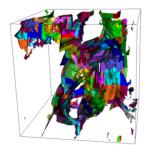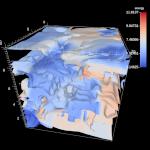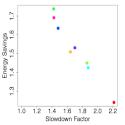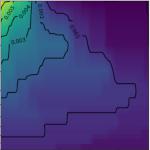|
Bio
Stephanie Labasan is an alumna of the CDUX group, receiving her Ph.D. in March 2019. Upon graduation, she joined Lawrence Livermore National Laboratory (LLNL) as a staff scientist. Stephanie's dissertation research focused on power/performance tradeoffs for scientific visualization workloads on supercomputers. During her time at UO, her research took two distinct phases. In the first phase, she established that the data-intensive nature of visualization workloads create useful propositions, e.g., for 10% slower performance, you can save 40% on energy. She did this by first studying one algorithm in depth (LDAV15) and then performing a more comprehensive study on a wider class of algorithms (IPDPS19). In the second phase, she considered overprovisioned supercomputers (where there are more compute resources than power) and implemented the PaViz system (EGPGV17), which directs power to where it will improve overall performance the most. PaViz differed from previous works not only in that it considered visualization, but also in that it used prediction to direct power, as opposed to the standard practice of adaption. Stephanie performed a followup work comparing these two approaches and found that prediction outperforms adaption (work in submission). During her time at UO, Stephanie did multiple internships at LLNL. She also did a year-long internship at Intel in Hillsboro, where she worked closely with the co-design teams of future x86 platforms to further improve power management capabilities. In June of 2016, Stephanie became a Lawrence Graduate Scholar, awarded by LLNL. As part of her scholarship, she completed her dissertation from LLNL, co-advised by Dr. Barry Rountree. Prior to joining UO, Stephanie received her B.S. in Computer Engineering from the University of the Pacific in Stockton, CA in 2013. She participated in the SC12 Student Cluster Challenge during this time, which inspired her to join the field of high-performance computing. Honors and Awards
Publications
| ||||||||||||||||







